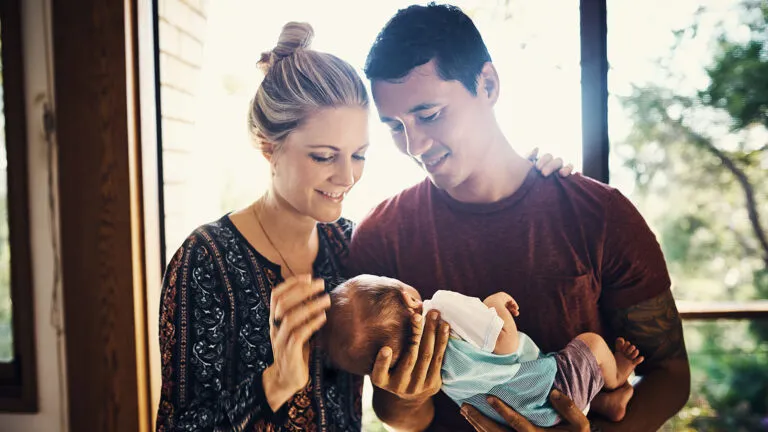It all happened so fast. My best friend Sandy telephoned from Florida to ask if I would consider being godmother to her second child, a son.
Godmother! I was honored. I was flattered. I’d never been asked to be a godmother before.
“Sure,” I replied easily.
“You don’t have to answer right away,” Sandy said. “Being a godparent is a serious responsibility. Maybe you’d like to think it over for a few days, maybe even pray about it.”
“Don’t be silly,” I laughed. “I’d love to be Josh’s godmother.”
With some unease I sensed that through one simple phone call, my identity had taken on a new, uncertain dimension. As mother of two, I was familiar with plain old garden-variety motherhood. But godmother—this was different. This was…
And then it hit me. I hadn’t the foggiest idea what being a godparent meant. What was it Sandy had said about god-parenting being a “serious responsibility?” They way she talked, her request had more to do with Josh than with honoring me. Clearly her expectations were high. But what exactly did she expect?
I thought of my own godmother, my mother’s best friend from her college days. Growing up, our families lived a thousand miles apart. On the few occasions our paths crossed, I remembered her as a warm and friendly woman.
When I was very young she sent me Christmas presents—sometimes a doll, sometimes a book. Still, I couldn’t recall that she had ever done anything that set her apart as a godmother.
Well, there was no turning back now. For better or worse, I’d impulsively said yes to Sandy’s request.
I said a simple prayer: Father, please teach me what it means to be a godparent.
Over the next several weeks I set out to discover everything I could about god-parenting. I’m an Anglican, my friend Sandy is Roman Catholic, so I talked to a number of pastors and priests. Books on the subject are surprisingly hard to find. I also talked to friends, godparents and godchildren alike, to learn from their experiences. And what I discovered was fascinating.
The tradition of god-parenting among Christians is an ancient one going back to the days of the early church, when believers were persecuted—and when life expectancies in general were much shorter than they are today.
While modern-day believers in America are not persecuted as the early church once was, it could be said that the healthy growth and development of our children’s faith is threatened as never before by the cumulative effect of society’s ills: widespread divorce; broken homes; rampant materialism; both parents working out of economic necessity rather than choice; lack of parental supervision; parental mental illness; alcohol and drug abuse; parental physical, sexual and emotional abuse; and the desensitization of our children to violence and sex via unsupervised viewing of inappropriate television, videos, movies and the internet.
In other words, kids today need all the help they can get! Over and over I was astonished to hear from clergy and laypeople alike that good god-parenting could make a powerful difference.
In the New Testament, in the Book of Acts, I read about whole households being baptized into faith, including infants, children and servants. Traditionally, the godparent acts as a steward of faith for the newly baptized child, serving as an added assurance (in addition to the parents’ efforts) that the child will be raised to understand fully his or her relationship to God and involvement in the church.
Today many godparents work to achieve this same blessed goal. Unfortunately, others still wrongly perceive the role as a purely social convention, a way for new parents to honor a family member or friend.
With that viewpoint, they lose the extra spiritual dimension to the relationship that grants a godparent license to reach out and be something more to the child than an aunt, uncle or “Mom’s best friend.” In fact, I learned of several cases in which it was the godparent who made the difference in a child’s coming to faith.
As a godmother, I learned that it would be my right (and responsibility!) over the years to pray for Josh, to introduce him to Christian concepts and to encourage any questions he might have about our faith. When a person becomes a godparent at a child’s baptism, many churches provide a certificate that includes helpful suggestions and prayers.
Much of this is very basic: Pray for your godchild daily; remember your godchild with a gift on his birthday, and—even more important—on the anniversary of his baptism; see that your godchild attends Sunday school and owns an age-appropriate Bible, and so on.
But it was the stories that people shared about their personal experiences as godchildren and godparents that really got to the heart of the task at hand.
One couple, over the course of two decades, had become something of experts when it came to gift-giving to their two godchildren, a boy and girl. Seeking to emphasize the unique spiritual dimension of their relationship to the children, they made a special effort to select gifts that had a specifically religious or inspirational content.
Bible storybooks and Noah’s ark toys gave way to tiny gold-cross jewelry and the classic children’s books by C.S. Lewis. When the children entered their teens they received diary-like prayer journals, faith-based rock and pop music CDs and video games.
Another friend, who was musical, had a grand time singing hymns and playing the piano with his godson.
Another woman stressed the importance of not only praying for but with her goddaughter. The first time she did this she admitted she felt a little bit embarrassed and shy. But she persisted, convinced that the simple act of praying—or as she put it, “talking to God”—had a profound effect.
It demonstrated that praying is something that she, a grown-up, did, and something that the child could do too. Later she was deeply moved when one afternoon the goddaughter, now grown and in the midst of grave marital problems, called her on the phone. “Oh, Nana,” the troubled girl said, “will you pray with me? I need someone to pray with, and I knew you would understand.”
Faith… prayer… comfort… make a difference… I kept hearing those words again and again. Being a godparent really was a serious responsibility, as Sandy had said. And yes, now I definitely wanted to do it.
Did you enjoy this story? Subscribe to Guideposts magazine.






